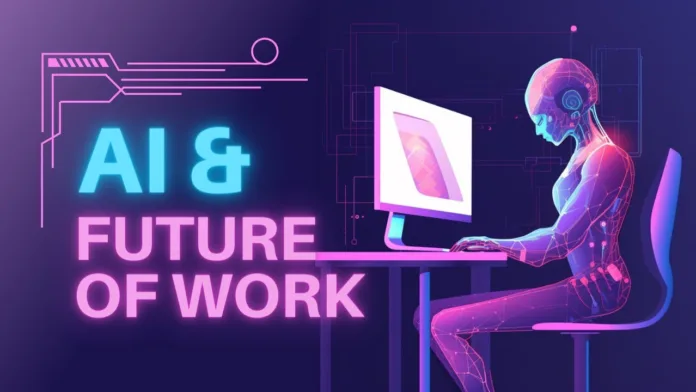The rise of AI and the future of work has become one of the most significant narratives of 2025. With artificial intelligence systems becoming increasingly capable, businesses around the world are restructuring how tasks are performed, how teams are built, and what it means to be “employed” in a digital-first world.
From reshaping traditional roles to introducing new ones, AI is not just a tool anymore—it’s a co-worker, a decision-maker, and in some cases, a full replacement for certain human tasks. But with this transformation comes a series of new challenges: automation anxiety, workforce reskilling, and ethical decision-making.
1. AI Is Reshaping Job Roles, Not Just Replacing Them
Contrary to popular belief, AI is not here to eliminate all human jobs. In 2025, it’s clear that AI augments many roles instead of replacing them entirely. While some routine or repetitive jobs in industries like manufacturing and customer service have been automated, entirely new categories of employment are emerging.
🔹 Examples of New Roles:
- AI Ethicist – Professionals who ensure AI systems align with human values.
- Data Annotators & Trainers – People who help “teach” AI by curating datasets.
- Prompt Engineers – Experts who optimize AI queries and outputs.
- Human-AI Interaction Designers – Creators of seamless interactions between humans and machines.
These jobs didn’t exist a decade ago, but today they’re critical to the tech ecosystem. AI is transforming workplaces into more dynamic, hybrid environments where human creativity and machine precision go hand in hand.
2. Automation Is Inevitable—But So Is Reskilling
As AI systems grow more sophisticated, they can perform complex tasks like financial analysis, legal documentation review, and even writing code. However, the industries that embrace automation the fastest are also the ones investing most in reskilling and upskilling programs.
Organizations now recognize that automation and human capital must evolve together. In 2025, online learning platforms and internal training programs are booming. Companies are using AI to personalize learning paths for employees, ensuring that workers evolve alongside technology.
🔸 Key Reskilling Areas:
- Machine learning basics
- AI ethics and governance
- Data literacy
- Digital collaboration tools
- Emotional intelligence in remote/hybrid settings
3. AI Is Changing Workplace Culture
Remote work and hybrid offices are now mainstream in 2025, and AI plays a pivotal role in supporting these models. Intelligent virtual assistants handle scheduling, email sorting, and even summarizing meetings. Chatbots conduct initial HR interviews. AI tools manage project timelines and provide real-time analytics to boost productivity.
🌐 AI in Daily Operations:
- HR & Recruitment: AI scans resumes and conducts candidate profiling.
- Customer Support: AI chatbots offer 24/7 service with natural language processing.
- Marketing: Predictive analytics help target audiences more accurately.
- Operations: AI optimizes supply chains in real-time.
AI is becoming the invisible infrastructure of modern businesses, silently orchestrating the flow of work while humans focus on strategy, innovation, and relationship-building.
4. The Ethical Dilemma: Who’s Accountable When AI Fails?
With great power comes great responsibility. As AI takes on more decision-making tasks, ethical concerns grow louder.
🧠 Major Ethical Concerns:
- Bias in AI algorithms: AI trained on biased datasets can perpetuate inequality.
- Transparency: Many AI decisions lack explainability, making accountability tricky.
- Job Displacement: As machines replace workers, who ensures a just transition?
The conversation about AI and the future of work is no longer limited to technologists. Governments, unions, and ethicists are all demanding clarity on how AI systems make decisions and who gets held responsible when things go wrong.
In 2025, regulations around AI fairness, transparency, and worker rights are tightening globally. Compliance teams are working closely with developers to create responsible AI frameworks.
5. AI-Powered Workplaces: The Human Touch Still Matters
Despite all the technological advances, there is one thing AI cannot replicate: the human touch.
Leadership, empathy, negotiation, creativity—these are skills that machines can support but not fully replace. Businesses that thrive in the AI age are those that combine automation with human values.
💡 Future-Ready Human Skills:
- Critical thinking
- Emotional intelligence
- Cross-cultural communication
- Innovation and entrepreneurship
Workplaces of the future are human-centered, data-driven, and ethically balanced. AI is a tool—not a threat—when wielded responsibly.
6. What’s Next?
Looking forward, AI will continue to evolve, becoming more autonomous and context-aware. However, its full potential will only be realized in tandem with thoughtful human governance.
The most successful professionals in 2025 are not just tech-savvy—they’re flexible, ethically aware, and constantly learning. Similarly, successful businesses are those that invest not only in AI but in people—ensuring that as technology progresses, society progresses with it.
Final Thoughts
AI and the future of work is not a distant concept—it’s our present reality. As we move further into 2025, the fusion of AI and human collaboration will define productivity, innovation, and sustainability across industries.
Now is the time for individuals and organizations to embrace change, invest in learning, and ensure that the future of work is inclusive, equitable, and empowering for all.
